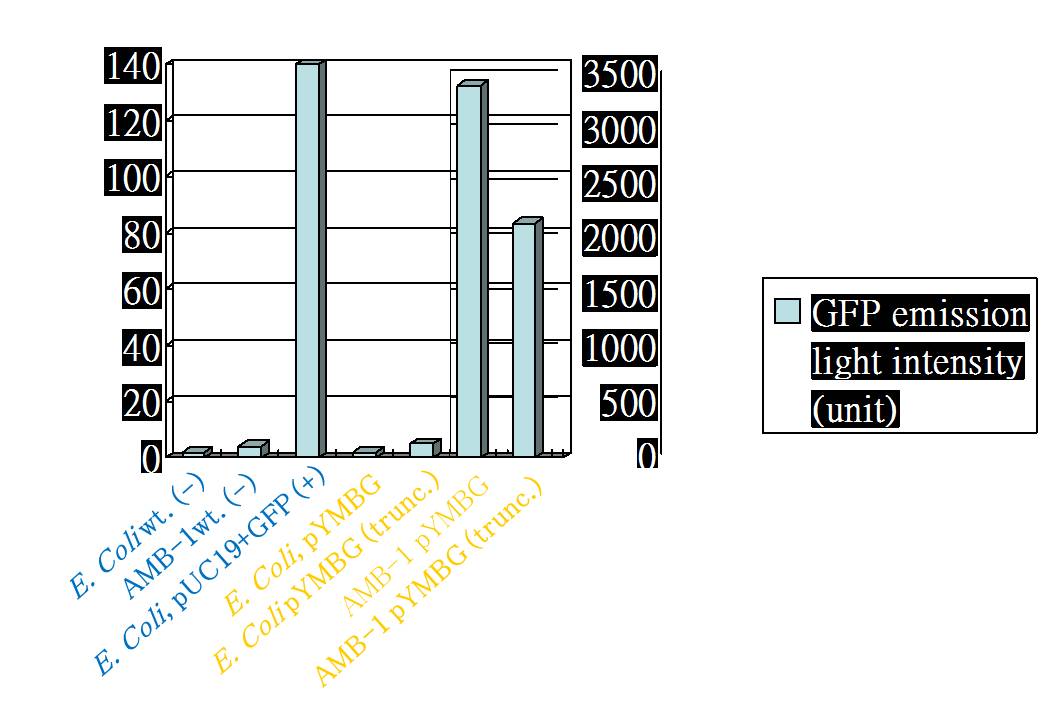Team:NYMU-Taipei/results/chassis1
From 2011.igem.org
Phonesents (Talk | contribs) |
|||
| (6 intermediate revisions not shown) | |||
| Line 28: | Line 28: | ||
=='''<font size=5><font color=crimson>pYMB Test Result</font></font>'''== | =='''<font size=5><font color=crimson>pYMB Test Result</font></font>'''== | ||
| - | |||
| - | |||
| - | |||
| - | |||
| + | '''<font size=4><font color=green>International Collaboration Reports</font></font>''' | ||
| + | One of our collaborators, [https://2011.igem.org/Team:Tsinghua Tsinghua] has experimentally confirmed pYMBG ([http://partsregistry.org/wiki/index.php?title=Part:BBa_K624021 BBa_K624021]) as an effective shuttle vector. | ||
| + | <center>[[image:chassis result.jpg|600px]] | ||
| + | </center> | ||
| - | =='''<font size=5><font color=crimson>"''Microscope Observation'' | + | =='''<font size=5><font color=crimson>"''Microscope Observation'':</font></font>'''== |
| - | + | ||
| - | + | ||
| + | <font size=3>This is an observation of magnetotactic bacteria under the stimulation of magnetic fields which come from below the screen. The movement and the motion of the bacteria can be suggested and analyzed for further prediction of the impact of magnetic force toward magnetosome. | ||
</font> | </font> | ||
<center> | <center> | ||
<html><object width="420" height="315"><param name="movie" value="http://www.youtube.com/v/EyPRUk3MlLw?version=3&hl=en_US"></param><param name="allowFullScreen" value="true"></param><param name="allowscriptaccess" value="always"></param><embed src="http://www.youtube.com/v/EyPRUk3MlLw?version=3&hl=en_US" type="application/x-shockwave-flash" width="420" height="315" allowscriptaccess="always" allowfullscreen="true"></embed></object></html> | <html><object width="420" height="315"><param name="movie" value="http://www.youtube.com/v/EyPRUk3MlLw?version=3&hl=en_US"></param><param name="allowFullScreen" value="true"></param><param name="allowscriptaccess" value="always"></param><embed src="http://www.youtube.com/v/EyPRUk3MlLw?version=3&hl=en_US" type="application/x-shockwave-flash" width="420" height="315" allowscriptaccess="always" allowfullscreen="true"></embed></object></html> | ||
| + | </center> | ||
| + | |||
| + | =='''<font size=5><font color=crimson>"''Naked-eyed Observation'':</font></font>'''== | ||
| + | |||
| + | <font size=3>This is an naked-eyed observation of magnetic bacteria with different strength of magnetic fields applied. The motion of magnetotactic bacteria is very obvious. | ||
| + | </font> | ||
| + | |||
| + | |||
| + | <center> | ||
| + | <html><iframe width="425" height="349" src="http://www.youtube.com/embed/I7PnRY4md4s?hl=zh&fs=1" frameborder="0" allowfullscreen></iframe></html> | ||
</center> | </center> | ||
Latest revision as of 01:31, 29 October 2011

Contents |
"Magnetotaxis": Chassis Page
Chassis page titled "[http://partsregistry.org/Magnetotaxis Magnetotaxis]" has been created in Parts Registry, please do visit this site for more useful information related to this species and the newly established chassis.
Growth Curve Of AMB-1 (BBa_K624032)
We measure AMB-1's growth under OD565, which is the best absorption wavelength for AMB-1. For electroporation operation, it is important to find out the log phase, since it’s the best time for electroporation.
By keeping AMB-1 in "log phase" (approximately 3~6 days in Enrich-MSGM, 7~10 days in MSGM), best results of electroporation are achieved. And after seven days, the bacterium would go into stationary phase. During the phase, the growth slows as a result of nutrient depletion and accumulation of toxic products. Growth rate and death rate of bacterium is best likely to meet equilibrium in this stage.
pYMB Test Result
International Collaboration Reports
One of our collaborators, Tsinghua has experimentally confirmed pYMBG ([http://partsregistry.org/wiki/index.php?title=Part:BBa_K624021 BBa_K624021]) as an effective shuttle vector.

"Microscope Observation:
This is an observation of magnetotactic bacteria under the stimulation of magnetic fields which come from below the screen. The movement and the motion of the bacteria can be suggested and analyzed for further prediction of the impact of magnetic force toward magnetosome.
"Naked-eyed Observation:
This is an naked-eyed observation of magnetic bacteria with different strength of magnetic fields applied. The motion of magnetotactic bacteria is very obvious.
 "
"






